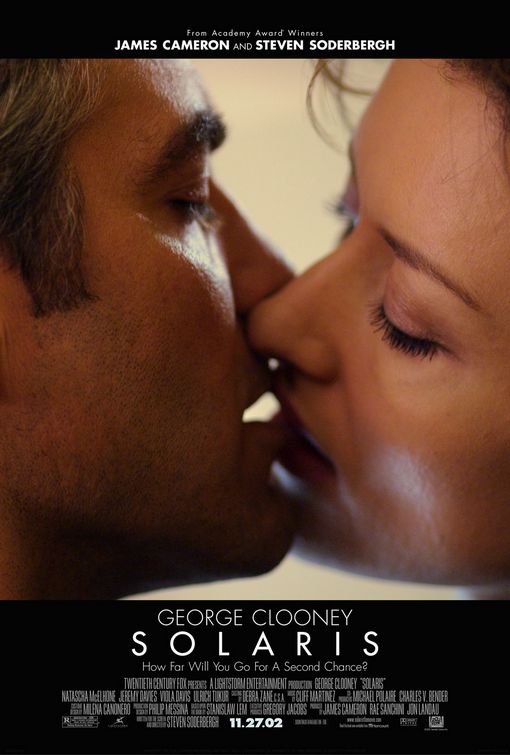- Solaris (2002 film)
Infobox Film
name =Solaris (2002)

caption =
director =Steven Soderbergh
producer =James Cameron
Jon Landau
Rae Sanchini
writer =Stanisław Lem (novel)
Steven Soderbergh
starring =George Clooney Natascha McElhone Viola Davis
Jeremy DaviesUlrich Tukur
cinematography =
music =Cliff Martinez
editing = Steven Soderbergh
distributor =20th Century Fox
released = start date|2002|11|29 (USA)
runtime = 99 min
language = English
budget = $47,000,000 (estimated)
amg_id = 1:267569
imdb_id = 0307479"Solaris" is a 2002 film directed by
Steven Soderbergh and starringGeorge Clooney .It is based on the science fiction novel by Polish writer
Stanisław Lem (which also inspired the critically-acclaimed 1972 Soviet film of the same name, directed byAndrei Tarkovsky ).Plot
Chris Kelvin is played by
George Clooney and Rheya byNatascha McElhone . Similar to the Tarkovsky film, this version of "Solaris" is a meditativepsychodrama set almost entirely on aspace station , adding flashbacks to the previous experiences of its main characters on Earth.A psychiatrist still dealing with the loss of his wife, Chris Kelvin receives a disturbing video message from a friend and scientist, Gibarian, asking for Chris' help and that he come to the enigmatic ocean world, Solaris. He agrees to go on the mission to Solaris as a last attempt to recover the crew. Kelvin, arriving at the space station, quickly learns that members of the crew have died (or even disappeared) under mysterious circumstances with the only two surviving members reluctant to explain the cause. After shockingly encountering his dead wife alive again, Chris discovers that Solaris has been creating physical replications of people familiar to each crew member. Up until the end, Chris struggles with the questions of Solaris's motivation, his beliefs and memories, and reconciling what was lost with an opportunity for a second chance.
Solaris borrows visual references from
Stanley Kubrick 's "" (1968) and "The Shining" (1980), and from Tarkovsky's "Zerkalo" ("The Mirror").Critical reception
Director Steven Soderbergh admits (on the DVD commentary track) that marketing was a challenge. The movie's trailer depicted a science fiction love story (or thriller) and may have raised expectations among potential film-goers that were not met, grossing $15 million (against an estimated $47 million budget). [http://www.imdb.com/title/tt0307479/business]
The " [http://www.timeout.com/film/newyork/reviews/74916/Solaris.html Time Out Film Guide] " describes this version as superior to the Tarkovsky version. However, the overall critical reception and popular votes do not share this opinion.
Rotten Tomatoes gave the film a 64% fresh approval rating which is a positive score but far from that of the Tarkovsky's adaptation, which earned a 97% rating. TheInternet Movie Database user ratings (as of April 2008) for the two versions are 6.2 and 8.2, respectively.Soderbergh, on the DVD commentary he did with
James Cameron for "Solaris", states thatStanisław Lem never saw the film (or any film since "Last Tango in Paris "), but claims that friends of Lem who had seen Soderbergh's version liked it.Lem himself called Soderbergh's film a "remake of the Tarkovski movie", and criticized it as departing far from his original intentions in writing the novel by focusing almost exclusively on the psychological relationship between the two main characters:
Notes
* The initial test screening ran 30 minutes longer, but was cut down due to negative studio feedback. Soderbergh has hinted that an Extended Edition might be released someday, depending on interest.
*James Cameron initially considered writing and directing but instead produced.
*Daniel Day-Lewis was asked to star but turned the role down.
* The film was selected to be " [http://www.videostoremag.com/insidevsm/scripts/photo_page.cfm?groupid=193 launched into space] " in 2003 by Team Encounter.
* The film was originally given an R rating by the MPAA primarily due to minor nudity. Steven Soderbergh appealed the decision, won the appeal and the movie was granted a PG-13 rating.
*And death shall have no dominion byDylan Thomas features significantly in the film.
* In an early script, the film takes place after: 11/14/31. It's not specified which year in the near future, but there is a possibility for 2031, 2131, etc.
* The DVD version of the film contains a copy of the script in play-form. It is feasible to produce the film as a stage production with minimal sets and design.
* Steven Soderbergh is quoted saying that if the audience does not enjoy the first ten minutes of the film then they might as well leave.External links
*
*
* [http://www.galilean-library.org/manuscript.php?postid=43847 In-depth analysis of the film at the Galilean Library]
* [http://www.lem.pl/english/kiosk/kiosk.htm#solstation Lem's comment on the 2002 version]
* [http://www.ricksternbach.com/kris.html Rick Sternbach's graphic designs for Solaris]
* [http://www.timeout.com/film/74916.html Time Out Film Review of Solaris]
* [http://futurefire.net/2005.02/nonfiction/solyaris.html Comparative review of "Solaris" book and two films] inThe Future Fire 2
* [http://rogerebert.suntimes.com/apps/pbcs.dll/article?AID=/20021122/REVIEWS/211220307/1023 Roger Ebert's review]
Wikimedia Foundation. 2010.
